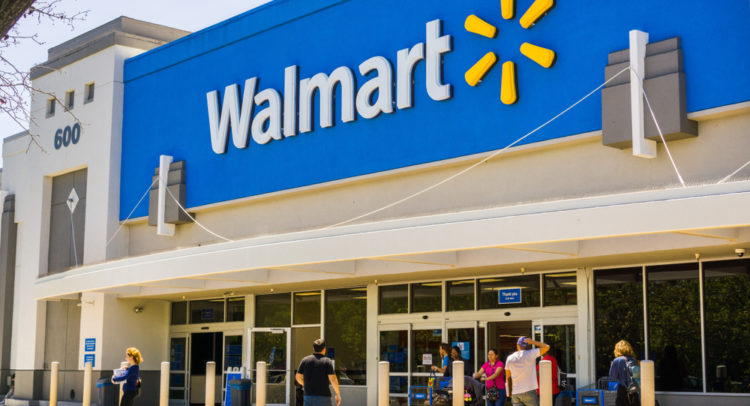Walmart (WMT) is a consistently excellent investment and deserves my bullish rating today.
Maximize Your Portfolio with Data Driven Insights:
- Leverage the power of TipRanks' Smart Score, a data-driven tool to help you uncover top performing stocks and make informed investment decisions.
- Monitor your stock picks and compare them to top Wall Street Analysts' recommendations with Your Smart Portfolio
Too Familiar for Many
Familiarity with the company and stock should not deter investors. There are a plethora of research reports every month about WMT. Analysts publish 82-90 articles each week. They are, on average, 100% bullish.
Share prices steadily climbed over the past five years: about $70 in FY’16, to a high of $152.57 over the past 52 weeks. WMT has dropped 2.1% this year.
Perhaps fatigue from threats of inflation, supply chain problems, virus variants, and labor shortages got to investors. However, Walmart beat all expectations with year-over-year increases in sales (9.2%) and total revenue (4.3% to $140.5 billion) in Q3 2022. Fatigue more than skepticism keeps short interest at a skimpy 1%.
Walmart reported mid-year debt to be $42.5 billion. The figure is not only down about 10% from the prior year, but Walmart holds nearly $23 billion in cash, and has an equity stake of $87 billion. Nothing scary here.
Scaredy Cats
Economic conditions scare some, but apparently not consumers.
Deloitte predicts over 8% consumer spending growth in 2021 after a nearly 4% contraction in ’20. Consumers surveyed claim to have more spendable income this year. They expect to spend nearly twice as much in 2022.
The Consumer Confidence Index suggests economic expansion will continue into 2022. Consumers have concerns. Nevertheless, they expect better business conditions and job growth in 2022.
Economist Diane Swonk preaches to never underestimate the American consumer with money in their pockets. All are good signs for WMT.
Outperforming Expectations
TipRanks gives WMT a Smart Score of 8 out of 10, predicting shares to Outperform. The Technicals are positive. The ROE asset growth is almost 10% for the trailing 12 months.
Eighteen Wall Street analysts set an average Walmart price target at $172.11. This implies an upside of 20.1%. In the past three months, three of the 18 put out a Hold. Fifteen of them have assigned a Buy. None suggest selling shares.

The dividend yield is only 1.52%. The payout ratio is comforting though, and still higher than the 1.33% average in the consumer goods sector
More Than a Retailer
Walmart is much more than a retailer. WMT is the second-largest company by revenue in 2021 (around $560 billion) with all the assets it owns. Though profits dropped over 9% because of extrinsic conditions, profits hit $13.5 billion.
The Walmart market power lets it expand into areas unknown to most people. For instance, one of its main subsidiaries is in media tech; it owns retailers of outdoor goods, the largest supermarket chain in Asia, a fashion line, accessories, art décor, and has deep pockets to keep building the empire.
In 2021, Walmart made 18 acquisitions and 13 investments totaling $25.24 billion.
Uncertainties
Three uncertainties shadow WMT. The first is management’s reputation for being greedy. Management has allegedly been outspoken, fighting the $15 minimum wage. Progressives call it “Greed in the Suites.”
One newspaper interviewed an employee of 11 years. While shareholders grow rich, she subsists on $12.85 per hour. The company is notorious for keeping working hours under the full-time minimum to avoid paying benefits.
Concomitantly, Walmart’s number one online competitor boosted pay ($18 on average) and benefits. Misleading or flawed, the bounding reputation might come back to bite Walmart. Its policies and reputation were factors in WMT’s failure in Germany.
Another risk might be the emerging purchasing power of Gen Zers; they prefer Walmart but not for online purchases. Gen Zers will be the largest consumer group in 10 years. They are of higher incomes and education than Walmart shoppers.
Management is aware and is making moves. For instance, more products appealing to Gen Zers are in inventory and Walmart is building a relationship with TikTok; crucial to winning over the younger crowd.
Walmart is a $398.5 billion market cap behemoth. When hedge funds and insiders sell, it is not surprising or a risk to other investors. Yet all year long they sold many more shares than bought.
Takeaway
Reputations are fleeting.
Think Sears, Montgomery Ward, Kmart, Sunbeam, and more. Positive reputations attract better people.
They underpin corporate sustainability. Management will do investors a good turn by positively confronting workforce allegations. Satisfied employees drive growth and profits, and that puts smiles on the faces of shareholders.
Not much else poses any serious risk to the share price or to the revenue and profits of this well-managed company. If it can build its appeal to Gen Z shoppers, it can entice them as investors like WMT did with Millennials, Gen Xers, and Baby Boomers.
Disclosure: At the time of publication, Harold Goldmeier did not have a position in any of the securities mentioned in this article.
Disclaimer: The information contained in this article represents the views and opinion of the writer only, and not the views or opinion of TipRanks or its affiliates Read full disclaimer >









